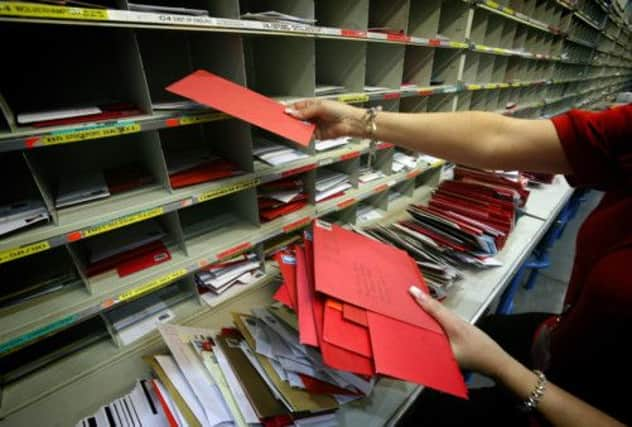99% of Royal Mail staff accept free shares


The employee scheme was a key part of the government’s privatisation of Royal Mail and just 368 of its 150,000 staff have opted out.
The figures have been unveiled as Liberal Democrat Business Secretary Vince Cable is today due to face the business select committee in the Commons, with the Communication Workers Union (CWU) threatening strike action in the run-up to Christmas to oppose the privatisation of Royal Mail.
Advertisement
Hide AdAdvertisement
Hide AdActivists will dress up as highway robbers, carrying banners saying “The Great British Royal Mail Robbery” to mark Mr Cable’s session before the committee.
The minister will face questions on the valuation of Royal Mail, including whether or not it has been undervalued by the government, details of the employee share scheme and the value of company assets.
The meeting will be held following the deadline for buying shares at midnight last night, with conditional trading starting on Friday and full trading next Tuesday, a day before the result of a CWU strike ballot.
Labour and the unions have warned the government it is selling the postal operator too cheaply, amid predictions of huge profits for investors.
The CWU said it had never told its members not to accept the shares, which could be worth about £2,000 each, adding that it did not mean they agreed with the privatisation.
CWU members are expected to back industrial action over issues linked to privatisation, with any strike set to be held on or after 23 October – the run-up to the busy Christmas period.
Mr Cable has warned Labour that its opposition to the sale was “irresponsible”, adding it was “dangerous” to imply there was an easy bargain to be made.
He told his Labour counterpart Chuka Umunna that he was magnifying a small minority of views which take a “short-term view” of the flotation.
Advertisement
Hide AdAdvertisement
Hide AdMr Umunna said: “It’s a dream for City speculators and hedge funds, but it’s a nightmare for the taxpayer, who ultimately doesn’t want this to happen anyway and is now being hugely shortchanged.”
Billy Hayes, general-secretary of the CWU, said: “It’s no surprise that the government has sold the postal service cheap to its friends in the City. The public didn’t want the service sold and will get a worse service as customers. Now they also know they are getting a bad deal as taxpayers too.”
Mr Cable wrote to Mr Umunna, saying that value for money for the taxpayer was an “absolutely key consideration”.
He wrote: “Getting the right price in the transaction is in the interest of taxpayers, consumers and employees alike, as is ensuring that ownership of the Royal Mail moves smoothly to responsible investors able to take a long-term, responsible approach to owning the company.
“The approach we are taking encompasses all of these considerations. I worry that the line you are taking, on the other hand, is irresponsible, simply magnifying a small minority of views which take a short-term view of the flotation.
“I also feel it is irresponsible to imply that a share offering looks significantly undervalued.
“I think you should consider the risk that you may be influencing the decisions of retail investors.”
Mr Umunna has urged the government to pull the plug on the privatisation to prevent a “massive bonanza” for City speculators.